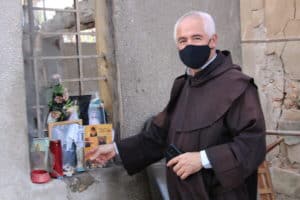‘Lebanon is Christian on account of its roots in Jesus Christ’
LEBANON is the country with the highest proportion of Christians in the Middle East. Aid to the Church in Need (ACN) has just announced a $6M aid package for the reconstruction of the country following the terrible explosion in the capital, Beirut, Aug. 4. Father Raymond Abdo, the provincial of the discalced Carmelite Fathers in Lebanon, reflects on the life of Christians in this country.
People often think that the people of the Middle East are all Muslims. Yet after World War II, most of the population of Lebanon was Christian. This proportion has diminished, but Christianity is still an important presence in the country, is that not so?
Yes. Lebanon is Holy Land because Jesus walked in Lebanon. The word Lebanon is found 72 times in the Bible. The demographic changes of the present time should not be allowed to downplay this reality. Lebanon is Christian on account of its roots in Jesus Christ. Today there is a political line taken by Hezbollah, which maintains falsely that the land of Lebanon was Muslim; they even want to create an Islamic republic in Lebanon. The demographic changes must not be allowed to undermine the importance of the existence of these Christian communities, not only here but also in Iraq and in other countries. Whether large or small, these communities express the continuity of the era of Christ, right up to our own times. The significance of the Christians of Lebanon is not merely numerical. The numbers may change greatly, but the essence of this Church is extremely important and symbolic.

What is the origin of Christianity in Lebanon?
Lebanese Christianity’s origins date back to the time of Jesus Christ. Today the largest Christian Church in Lebanon is the Maronite Church, which is small in worldwide terms, but it is the majority within the country. This Church came into being with Saint Maron in the fourth and fifth centuries. The Maronite community lived originally in Syria, in a region that was close to Lebanon, but in the eighth and ninth centuries they sought peace and security in Lebanon. Ever since then there has been a Maronite community, which is distinguished by its strong fidelity to Rome and to the Pope.
It is the only Church that has never been divided in two. Maronite means as much as Roman Catholic, even though it is called Maronite of the eastern Syriac rite, because it uses the Syriac language. It has suffered great persecutions, and during the seventh, eighth and ninth centuries lived totally hidden and isolated in the mountains, before finally being able to emerge into the light during the 11th century.
Many Lebanese have been forced to leave their country, not always for economic reasons. many of them left because the Church was greatly persecuted, did they not?
Yes, apart from the persecutions I mentioned in the earliest centuries, there were many acts of genocide against Christians, including before World War I. The most important of these were those perpetrated by the Druze against the Christians in 1840 and in 1860. That was under Turkish rule. I am not speaking about the politics, I am only speaking about Christ, and these poor people were forced to go, not knowing where to. Wherever the ships docked, that was where they disembarked. Initially, most went to Argentina, then Brazil and the United States. After the First and Second World Wars many people continued to travel to these countries. That is why you now have this large community in Brazil, as well as in Europe and Australia. We now have 12 million in this diaspora. I believe that when the Lord asked these people to leave Lebanon, it was to bear witness, to take with them the word of God, their experience of Christ.

Lebanon saw itself bled dry by emigration, but at the same time it has also welcomed many people who themselves have fled from wars and religious persecution—for example the Armenians in 1915.
Nobody likes to talk about that horrible genocide. But it is true, some of them came to Lebanon and they are now Lebanese and an integral part of our country. That is why we are also grieving so greatly at what is happening right now in Armenia, because it reminds us of the Ottoman era. After them, it was the Palestinians who came, after the war in Israel, because they were fleeing or being expelled from the country. To this day there are still at least ten Palestinian refugee camps in Lebanon. They have their own laws, they are protected, they have their own legislation, but they are contributing to the destabilization of Lebanon because there are also terrorists who have sought refuge in these camps.
After that it was the Syrians and the Iraqis, because of the invasion by the Islamic State in Iraq and the war in Syria. This has also destabilized Lebanon’s status quo. Is this partly to blame for the crisis that the country is now suffering?
The economic situation is critical; the infrastructure of the country cannot support so many people. For example, we cannot have electricity all day, because there is not enough to supply everyone. The consumption of electricity alone is an enormous expense, and there are many other things as well. The infrastructure of the country is extremely limited, and the population is very large. This is the cause of the economic crisis, and serious problems of a social nature and political tensions that will lead nobody knows where. Now the situation has been made still worse by the coronavirus pandemic, and because we feel the lack of security in the country.
—María Lozano

